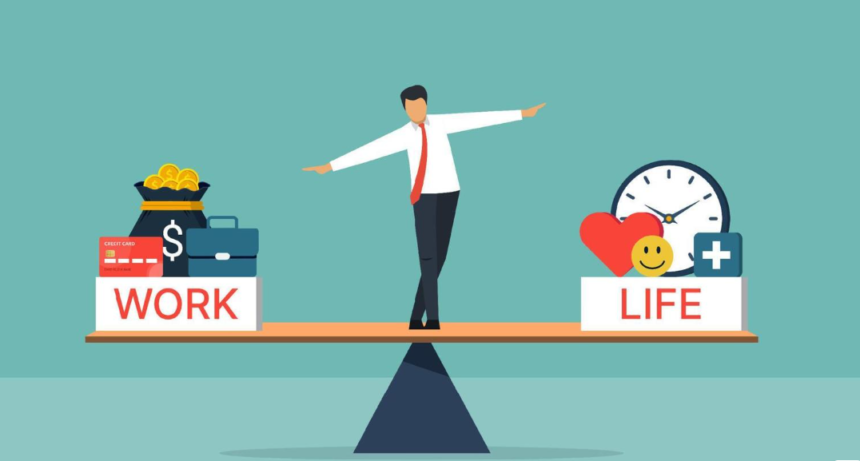Work-life balance is the amount of time you
spend doing your job versus time spend with your friends and family or loved
ones while pursuing your interests.
The better work life balance is, the better is your wellbeing
How work-life balance look like?
The nature of our lives and responsibilities to manage means
that work-life balance and various other integrations of life look different
for everyone. Some examples includes:
- An working women who uses her work breaks to look after her child in office crutch.
o A stay-at-home working parent who tackles assignments while handling their
newborn schedule as well.
Importance of work-life balance to Health
Your work-life balance can improve your overall well-being,
including physical, emotional, and mental health.
Studies have found that long hours of work can lead to
serious health issues such as ‘impaired sleep, depression, heavy alcohol
drinking, diabetes, impaired memory, and heart disease’. Unfortunately, when
such conditions arise, they can also affect our work-life issues, which in turn
can exacerbate the conditions , leading to a vicious cycle.
Who has health has hope and he who has hope has everything in life to achieve.
Ways to improve work-life balance
You will find few methods for developing a work-life integration approach adapted from research conducted. In the study, the researchers interviewed some professionals about work-life balance and identified few-step process that helped others achieve theirs. Below, steps have been clubbed together into a three-step structure to help simplify the process. These steps are:
-
- Pause and pay attention to your tasks
- Reprioritize and do reassessment of your work
- Reflect, refine, repeat
As you work through these steps, recall that finding for an approach that works for you is a process that will likely require several attempts. Rather than being a sign of failure, modulating your approach is an integral part of the process.
Step 1: Pause and pay attention
Identifying how the different parts of your life get impacted and is a necessary step in developing a new work-life integration that serves
your needs.
- Am I spending enough quality time doing what I want?
- Am I giving enough time and energy to people or things that are important to me?
- Do I feel focused with my professional or personal goals? Why or why not?
Step 2: Reprioritize and do reassessment of your work
- What task really matters to me the most, and am I able to do enough portion of it?
- Where can I make compromises? Where I can’t ? Where have I been making so many
compromises? - What alternative actions should be taken to ensure enough time and energy is being devoted to my goals and relationships?
Step 3: Reflect, refine, repeat
It’s time to implement the changes, which you understand what you can do to make a more manageable work-life balance.
For some, it may mean setting firm boundaries at work about when you can be contacted whilst out of the office, whereas for others, it might mean re-scheduling personal time for self-care. Still, some others might look for more flexible work that allows them to take parental leave when needed or control their work day with flexible hours.
Whatever actions you decide are needed to create a good work-life balance, you should be conscious enough about it that you will likely need to continue refining it over time. Big life changes take time, so reflecting on your approach and refining it periodically will probably be integral parts of the process.
Don’t strive for the perfect schedule; strive for a realistic life. Some days, you might focus more on work, while other days you might have more time and energy to pursue your hobbies or spend time with your loved ones. Balance is achieved over time, not each day. Your overall physical, emotional and mental health should be
your main concern first. If you struggle with anxiety or depression and think about therapy session that would benefit you, fit those sessions into your schedule, even if you have to
leave work early or ditch your evening spin class. If you are battling a chronic illness, don’t be afraid to call in sick on rough days.
Overworking yourself prevents you from getting better, possibly causing you to
take more days off in the future.
“Prioritizing your health first and foremost will make you a better employee and person”
Cutting ties with the outside world from time to time allows us to recover from weekly stress and gives us space for other thoughts and to ourselves for ideas to emerge. Unplugging can mean something simple like practicing meditation on your daily commute time instead of checking work emails or thinking about work.
Taking a break to unwind yourself is critical to success and will help you feel more energized and productive when you’re on the clock. Taking vacation time and shutting off work completely for a while is important for physically and mentally recharge. Employees usually have unused vacation days left over at the end of the year. They are often worried about taking time off will disrupt the work, and they will get backlog of work when they will return. This fear should not restrict you from taking a much-needed break. While planning time with your loved ones, create a calendar
for family dates. It will ensure that you spend quality time with them without
work-life conflict. Just because work keeps you busy doesn’t mean you should
neglect personal relationships.
Set boundaries for yourself and your colleagues to avoid interruptions. When you leave the office, avoid thinking about upcoming projects or answering emails. Consider having a separate computer or phone for work so that you can shut it off when you clock out. Set your achievable goals by implementing time-management strategies, analyzing your to-do list and cutting out tasks that have least value. Pay attention to your most productive work time is, and block that time off for your most important work-related activity. Avoid checking your emails and phone frequently, as those are major time-wasters that derail your attention. energy and productivity. Structure your day to increase productivity at work, that can result in more free time to relax outside of work.
None of us is superhuman, and giving 100 percent at work
will result in slip-ups in other areas of our lives. Of course, succeeding at
work is important, but we’ve got only one life to live. We shouldn’t sacrifice
our personal lives or our health to succeed professionally.
Achieving a healthy work-life balance is key to being a well-rounded individual who thrives at home and in the office. But that takes work, and the right equilibrium looks different for everyone. It could mean taking a break, arranging a flexible schedule with your employer or finding an entirely new job that fits your needs. Reflect upon what you need to have better work-life balance, then take action to make it happen. Set limits on your workload and be assertive when declining additional tasks that may impact your work-life balance. It’s important to prioritize your well-being and set boundaries around your time and energy. Though it may be tough to say no, it’s an important skill – and it can even pay off in the quality of the rest of your work.
A common response to a poor work-life balance is feeling stressed. Stressed about not finishing enough work, working too much, working too little, not seeing friends and family enough, and many other things.
Having a healthy work-life balance benefits your mind, body, and mood as all three can be impacted by stress. A stressed person will likely be unpleasant, inefficient, and moody, and may keep to themselves away from people instead of socializing. One unfortunate side effect of having a poor work-life balance is that employees may be take time off for more sick days or health days.This may also cause more work to be pushed on the remaining employees, which increases the original problem of having a poor work-life balance.
If the work-life balance at your business is poor enough, employees may even consider finding a new job.
The fact is that some employees who value their free time enough will be willing to go through the trouble of finding new jobs with work-life balance. Even if it means potentially giving up perks at their current job. Higher stress from a poor work-life balance may also lead to your employees getting sick more often. There’s no denying that stress can take a toll on health issues, which means more employees calling out regularly.

